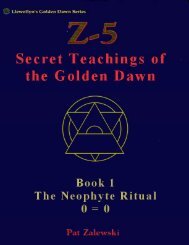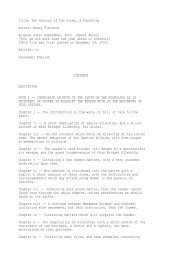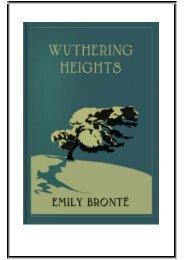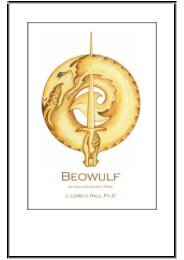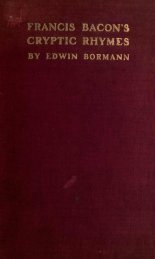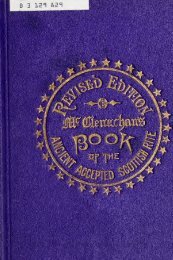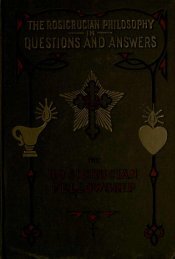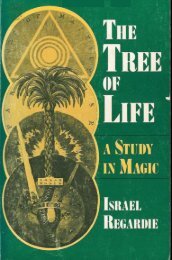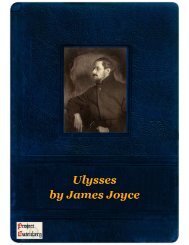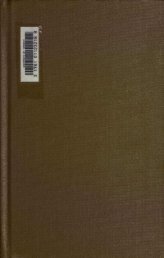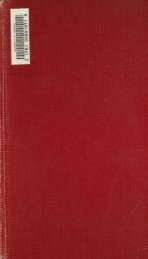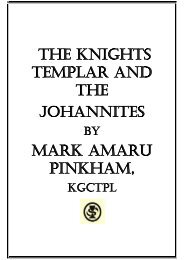Click to download PDF version: 3.87MB - Global Grey
Click to download PDF version: 3.87MB - Global Grey
Click to download PDF version: 3.87MB - Global Grey
You also want an ePaper? Increase the reach of your titles
YUMPU automatically turns print PDFs into web optimized ePapers that Google loves.
197 At the Back of the Black Man's Mind By R. E. Dennett<br />
The number of Yoruba gods commonly reckoned is 401, but it is strictly more correct <strong>to</strong><br />
say that the number is 600, arranged generally under two divisions, 200, as the<br />
Babalawos would say, placed on the right-hand side, and 400 on the left-hand side. But<br />
the gods more commonly worshipped are Ifa, Oduduwa, Obanta and Obanla his wife,<br />
Osun, Ogun, Yemaja, Buruku, Obalufon, Orisa-oko, and Soponno, Sango and Obatala.<br />
88These<br />
Deities are generally known among us as "Orishas, " a term which, after the<br />
religious tradition of the country, was originally applied <strong>to</strong> some being whom Ifa, or<br />
Orunmila, the Son of God, had sent out with others <strong>to</strong> search about for and collect<br />
<strong>to</strong>gether the wisdom which he had strewn about, and who were successful in their<br />
search and collection whilst others failed, and who were then spoken of as "Awon ti o ri<br />
sa," i.e., those who were successful in making their collection, and who after, and in<br />
consequence of this, became objects of worship. But others have represented the term<br />
"Orisha" as derived from the circumstance of a serious difference on a particular<br />
occasion between two friends named Arin and Ogba, a difference in which some elders<br />
interfered, over a potsherd, "Isha," which the one had made a present of <strong>to</strong> the other, but<br />
a return of which the giver afterwards from envy demanded, and which after its return<br />
was accounted sacred and became an object of worship; and they say that from this<br />
every other object of worship has been called an "Orisha" (Ori-isha), in allusion <strong>to</strong> the<br />
potsherd over which there had been a severe difference.<br />
Sango, the god of the atmosphere; Aramife, the god of fire; Aje, the god of trade;<br />
Obalufon, the god of a prosperous empire; Koriko<strong>to</strong> and Oke, gods of child-birth; the<br />
gods of the sea, Yemoja, Okun or Olokun, and Osun; the god of war, and the goddess of<br />
hunting (Ogun and Oranmiyan, Ososi and Uja his wife, Obalogun and Akipo his wife, and<br />
Ikuligbogbo); the god of agriculture, Ogun; the gods of prophecy and song, Ifa and<br />
Erinle; the god of eloquence, Obatala; the god of love and beauty, Olokun; the god of<br />
wisdom, Olokun; and the deities of the hearth fire, the Egun, or spirits of deceased<br />
ances<strong>to</strong>rs.<br />
Some of the Yoruba Divinities have been borrowed from other tribes.<br />
Sango, from the Niger terri<strong>to</strong>ry; Eko-Ifa, from the Akoko tribe; and Aje, from the Egun or<br />
Popo tribe.<br />
Yorubans, whose heathen and idolatrous worship is a recurring festival at which a<br />
particular divinity is worshipped, have from this circumstance often denominated a day<br />
in every cycle of five days from the name of the deity <strong>to</strong> whose worship it is devoted,<br />
e.g., thus we find one day named Ojo Jakuta, i.e., the day when Jakuta or Shango89<br />
is<br />
worshipped; Ojo Obatala, i.e., the day when Obatala is worshipped; Ojo Ifa, i.e., the day<br />
when Ifa is worshipped, or when he sits on a throne like a king; Ojo Abameta, i.e., the<br />
88 Compare the BAKICI BACI of the Bavili and the EBAMI of the Bini<br />
89 Shango is an imported "power," see the days of the week of the Bavili and Bini, pages 64 and 214<br />
www.globalgrey.co.uk



